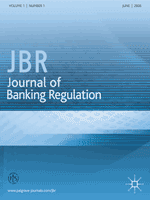
Journal of Banking Regulation
Scope & Guideline
Illuminating the Intersection of Finance and Policy.
Introduction
Aims and Scopes
- Regulatory Frameworks:
Analyzes the structure and effectiveness of banking regulations, including compliance with international standards and the implications for bank stability. - Risk Management and Resilience:
Explores methodologies for assessing and managing risks within banks, focusing on resilience strategies against financial crises and economic downturns. - Impact of Economic Policies:
Investigates the effects of macroeconomic policies and external factors on banking performance and regulatory compliance. - Innovation in Banking:
Examines the role of technological advancements, such as digital currencies and regulatory technologies, in transforming banking practices and regulatory approaches. - Cross-Border Banking Issues:
Focuses on the challenges and regulatory considerations in cross-border banking operations, particularly within the context of the European Union and emerging markets. - Corporate Governance:
Studies the influence of governance structures on banking performance, risk-taking behavior, and regulatory compliance. - Environmental and Social Governance (ESG):
Evaluates the integration of environmental and social factors into banking regulations and practices, reflecting the growing importance of sustainability in finance.
Trending and Emerging
- Sustainability and ESG Integration:
There is a growing focus on how environmental sustainability and social governance are being integrated into banking regulations, reflecting broader societal demands for responsible banking practices. - Digital Transformation and Fintech:
Emerging themes around digital currencies, fintech innovations, and the impact of technology on banking regulation are increasingly prevalent, indicating a significant shift in how banking operates. - Macroprudential Regulation:
Research on macroprudential policies is gaining importance as regulators seek to address systemic risks and ensure financial stability in an interconnected global economy. - Behavioral Economics in Banking Regulation:
The incorporation of behavioral economics into banking regulation is emerging, exploring how psychological factors influence regulatory compliance and banking decisions. - Cross-Border Regulatory Cooperation:
With globalization, there is an increasing emphasis on the need for cooperation among regulatory bodies across borders to manage the complexities of international banking.
Declining or Waning
- Traditional Banking Models:
There has been a noticeable reduction in papers focusing solely on traditional banking models, as the industry shifts toward more innovative and technology-driven approaches. - Conventional Risk Assessment Techniques:
Research on conventional risk assessment methods is declining, likely due to the emergence of more sophisticated models that incorporate big data and predictive analytics. - Focus on Domestic Regulation:
The journal appears to be moving away from exclusively domestic regulatory issues, as cross-border banking and international regulatory harmonization gain more attention. - Historical Analysis of Banking Crises:
There is a decrease in studies that analyze historical banking crises, as contemporary issues and forward-looking regulatory approaches take precedence. - Theoretical Frameworks without Empirical Evidence:
Papers that rely heavily on theoretical frameworks without empirical backing are becoming less common, as there is a push towards more data-driven research.
Similar Journals

Annual Review of Financial Economics
Navigating the Complexities of Market BehaviorAnnual Review of Financial Economics, published by Annual Reviews, stands as a pivotal journal in the fields of Economics and Finance, recognized for its rigorous analysis and comprehensive reviews since its inception in 2010. With an impressive impact factor reflected in its Q1 ranking in both Economics and Econometrics and Finance for 2023, this journal serves as an essential resource for researchers, professionals, and students keen on understanding the dynamic interplay of financial theories and practices. The ISSN 1941-1367 and E-ISSN 1941-1375 signal its commitment to accessibility and dissemination of cutting-edge research within the community. Addressing crucial topics from market behavior to economic modeling, each annual volume synthesizes the latest findings and theoretical advancements, thus contributing significantly to the global discourse within financial economics. With its high Scopus rankings, including a finance rank of #75 out of 317, the journal continues to foster a deep understanding of financial systems and their implications, serving as an invaluable tool for anyone engaged in the broader economic landscape.
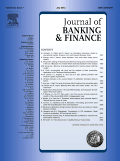
JOURNAL OF BANKING & FINANCE
Shaping Tomorrow's Banking Insights TodayWelcome to the Journal of Banking & Finance, a premier publication in the fields of finance and economics, expertly published by Elsevier. With its esteemed Q1 ranking in both the Economics and Econometrics and Finance categories for 2023, this journal frequently garners significant attention from researchers, professionals, and academics alike. Established in 1977, it has become a crucial resource for the latest research and advancements in banking and financial services, influencing policies and practices on a global scale. The journal's commitment to high-quality, peer-reviewed content ensures that it not only contributes to academic discourse but also drives real-world financial innovation. As part of the respected Elsevier publishing collection, the journal's rigorous standards and comprehensive analysis serve as indispensable tools for those seeking to understand and navigate the complexities of the financial landscape. Located in the Netherlands, the Journal of Banking & Finance continues to play a vital role in shaping the future of financial research through its impactful insights and research contributions.
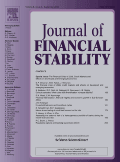
Journal of Financial Stability
Pioneering research for resilient financial systems.The Journal of Financial Stability, published by Elsevier Science Inc., is a renowned academic journal that serves as a premier platform for the dissemination of innovative research in the fields of finance, economics, and econometrics. With an ISSN of 1572-3089 and an E-ISSN of 1878-0962, this journal has established itself as a leader in its category, ranking Q1 for both Economics and Finance in the 2023 category quartiles. This positions it amongst the top 13% of journals in Economics and the top 35% in Finance, according to Scopus rankings. Covering a wide range of topics related to financial stability, the journal aims to fulfill its objective of advancing scholarly communication and providing researchers, professionals, and students with valuable insights into contemporary financial challenges and innovations. Operating from the Netherlands and converging from 2004 to 2024, the Journal of Financial Stability continues to contribute significantly to the academic landscape, inviting submissions that push the boundaries of knowledge and understanding in financial systems.
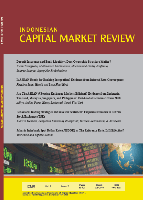
Indonesian Capital Market Review
Advancing Knowledge in Indonesian Financial MarketsIndonesian Capital Market Review is a prominent academic journal dedicated to the exploration of financial markets, investment strategies, and economic policies within Indonesia and Southeast Asia. Published by Universitas Indonesia, this journal has been an essential resource for researchers, professionals, and students since its inception in 2009, offering open access to its content to promote wider dissemination of knowledge. With an ISSN of 1979-8997 and an E-ISSN of 2356-3818, it aims to bridge the gap between theoretical frameworks and practical applications in the capital markets. By rigorously vetting its publications, the journal enhances the academic discourse surrounding financial systems, thereby empowering stakeholders with empirical insights. The commitment to open access ensures that groundbreaking research is readily available to a global audience, advancing the understanding of capital market dynamics in Indonesia and beyond.
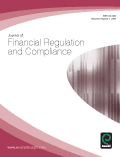
Journal of Financial Regulation and Compliance
Exploring Innovations in Financial RegulationThe Journal of Financial Regulation and Compliance, published by Emerald Group Publishing Ltd, serves as a vital resource for researchers, professionals, and students in the fields of finance, strategy, and management. With an ISSN of 1358-1988 and E-ISSN 1740-0279, this esteemed journal has been at the forefront of scholarly dialogue since its inception in 1996, and it will continue to publish until 2024. As a recognized entity in the academic community, it holds a Q3 category ranking in both Finance and Strategy and Management according to the 2023 metrics. The journal is indexed in Scopus, with a respectable rank of #278 out of 478 in its category, placing it in the 41st percentile, further underscoring its contribution to relevant academic discourse. Although it does not currently offer Open Access, it produces high-quality, peer-reviewed content that addresses the latest developments and challenges in financial regulation and compliance. This journal is essential for anyone looking to engage with contemporary issues and theories shaping the financial landscape.

Journal of Financial Regulation
Connecting research with real-world regulatory challenges.The Journal of Financial Regulation, published by Oxford University Press, serves as a pivotal platform for research and discourse in the field of finance and regulatory frameworks. Since its inception in 2015, this esteemed journal has captured the attention of scholars and practitioners alike, achieving a notable Q2 ranking in the finance category (as of 2023) and securing its place among the top 20% of journals in its field. With a robust focus on contemporary issues surrounding financial regulation and governance, the journal provides valuable insights and comprehensive analyses relevant to both global and local regulatory environments. Although it is not an open access journal, it offers exclusive content that is crucial for advancing knowledge in finance, evidenced by its strong performance with a Scopus rank of #65 out of 317 in the disciplines of Economics, Econometrics, and Finance. Researchers, professionals, and students are encouraged to explore the rich array of articles that contribute to the ongoing conversation in financial regulation, making it an essential resource for anyone engaged in the field.
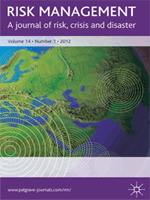
Risk Management-An International Journal
Empowering Insights for a Safer FutureRisk Management - An International Journal is a premier publication dedicated to advancing the understanding and methodologies of risk management across various sectors, including business, finance, and economics. Published by Palgrave Macmillan Ltd in the United Kingdom, this journal not only maintains a robust presence in the scholarly community but also ranks in the Q2 category for Business and International Management and Finance, as well as Q3 for Economics and Econometrics and Strategy and Management. With its diverse scope and commitment to high-quality research, the journal provides essential insights for academics, practitioners, and students alike, helping to shape the future of risk management practices globally. While not an open-access journal, its rigorous peer-review process ensures that only the most impactful and relevant studies are featured. Covering topics that converge the years from 2006 to 2024, Risk Management represents a vital resource for those looking to deepen their knowledge in this critical field.
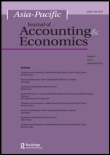
Asia-Pacific Journal of Accounting & Economics
Bridging theory and practice in Asia-Pacific accounting and economics.Asia-Pacific Journal of Accounting & Economics, published by Routledge Journals, Taylor & Francis Ltd, is a prestigious platform dedicated to advancing scholarly research in the fields of accounting, economics, and finance. Established in 2000 and converging its academic rigor through 2024, this journal serves as an essential resource for researchers, professionals, and students seeking to explore the interconnections and complexities within these disciplines. With a notable impact reflected in its Q3 rankings in Accounting, Economics, and Finance, the journal showcases the latest empirical research and theoretical advancements. Although it operates under a traditional access model, its commitment to quality and relevance in the Asia-Pacific region continues to make it a vital publication for those aiming to contribute to the understanding of economic dynamics and financial practices. Researchers and professionals are encouraged to engage with the articles herein to stay abreast of new insights and methodologies shaping the landscape of accounting and economics.

International Journal of Financial Studies
Empowering finance research through open access.The International Journal of Financial Studies is a premier publication dedicated to advancing the field of finance through open-access research. Published by MDPI based in Switzerland, this journal offers researchers, professionals, and students a platform to disseminate their findings in an accessible format since its establishment in 2013. With its ISSN of 2227-7072 and a commendable impact reflected in its Q2 ranking in finance, it occupies an influential position among finance-related journals, as evidenced by its 65th percentile rank in Scopus. The journal encompasses a wide array of topics in finance, making it essential reading for those seeking to stay abreast of current research trends and methodologies. As an open-access journal, all articles are freely available, significantly enhancing the visibility and reach of published studies, which is crucial for fostering collaboration and innovation within the global financial community. Published continuously until 2024, the International Journal of Financial Studies is not just a source of knowledge; it is a critical contributor to the progression of financial scholarship.

Journal of Central Banking Theory and Practice
Pioneering Discussions on Central Banking PracticesThe Journal of Central Banking Theory and Practice, published by SCIENDO, is a leading open-access journal that has been providing valuable insights into the realms of central banking, monetary policy, and financial stability since its inception in 2012. With its ISSN 1800-9581 and E-ISSN 2336-9205, this journal emphasizes rigorous scholarly research, catering to a wide audience of economists, finance professionals, and academic researchers. Based in Germany, the journal has established a strong reputation, evident from its improved category quartiles - moving from Q3 in Economics, Econometrics, and Finance to a commendable Q2 in 2023. With an impressive Scopus rank of #83/288 in General Economics and a 71st percentile ranking, it stands as a pivotal resource for understanding current trends and practices in central banking. Authors are encouraged to submit high-quality, original research that fosters knowledge and advances the field. This journal not only disseminates significant findings but also promotes discussions that are critical for policymakers and stakeholders in the financial sector.